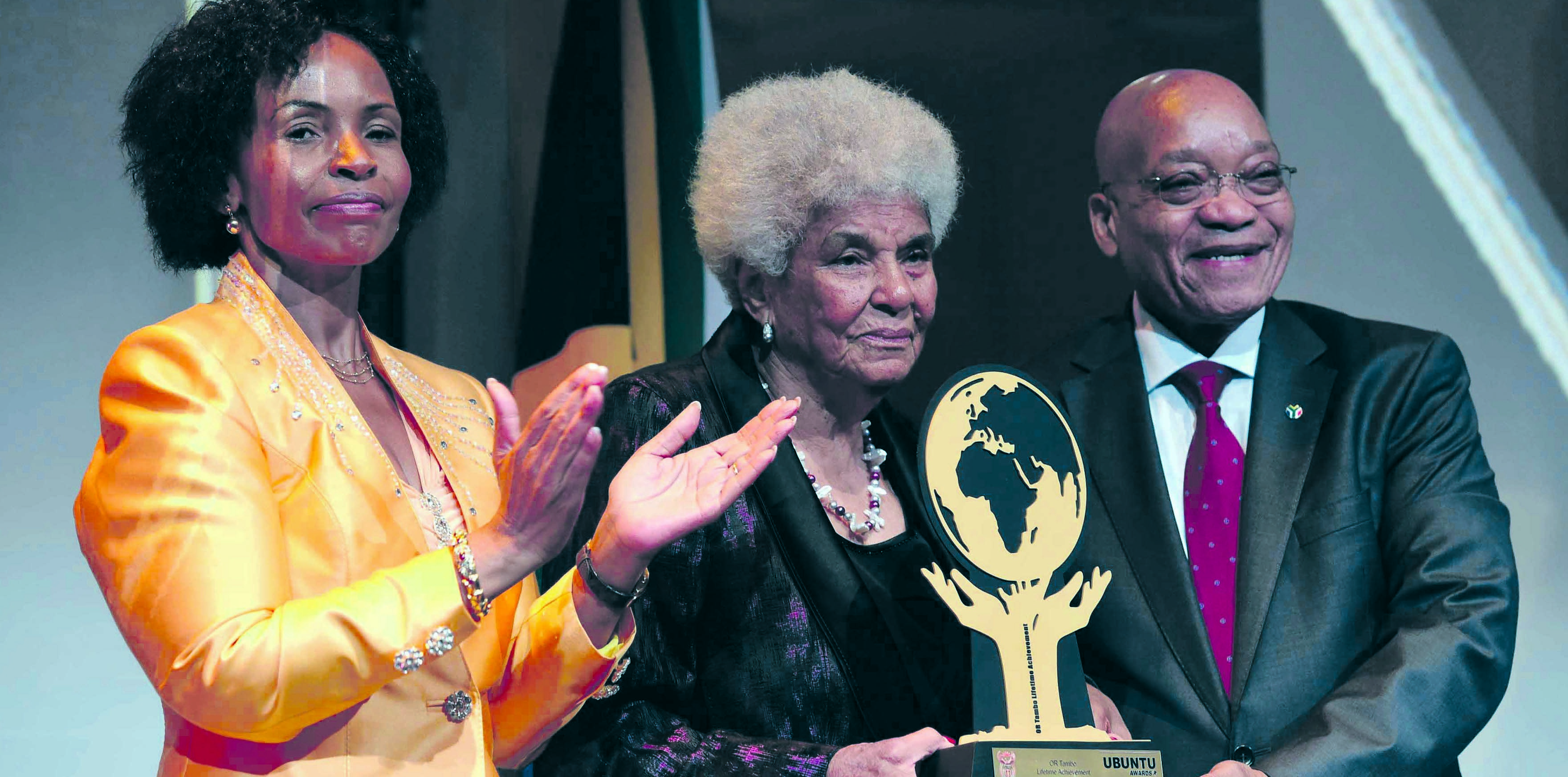
In January 2014, the ANC presented Mompati and Gertrude Shope with its highest honour, the Isithwalandwe/Seaparankoe award. Literally translated, Isithwalandwe means “the one who wears the plumes of the rare bird”. The ANC says: “It is an award bestowed on only the bravest warriors of the people, on those who distinguished themselves in the eyes of all the people for exceptional qualities of leadership and heroism.”
The conferring of Isithwalandwe to the two women should have been an event in its own right accompanied by a full citation on why they can be counted among the bravest warriors of the people, joining the ranks of Albert Luthuli, Yusuf Dadoo, Moses Kotane, Nelson Mandela, Walter Sisulu, Govan Mbeki and legendary female leaders Helen Joseph, Lillian Ngoyi and Ray Simons.
Ruth Mompati was born Ruth Seikgomotso Seitshoko – in what would become the North West province decades later – on September 14 1925. Mompati, the name of her first son, was the name she took when she went into exile.
Mme Ruth served the ANC in many capacities over many decades from the time she joined the ANC in the 1950s. In 1953, she joined the Mandela-Tambo law firm as a secretary and rapidly rose in the ranks of the ANC. She was a founder member of the Federation of SA Women in 1954 and was one of the organisers of the historic Women’s March on August 9 1956.
She was one of the first women to go into exile in 1962 and undergo military training in the ANC’s armed wing, Umkhonto weSizwe. She was a member of the party’s national executive, a leader of its women’s league and the ANC’s chief representative in London. Because she enjoyed the absolute trust of the leadership, including her former law-firm boss ANC president Oliver Tambo, she was entrusted with sensitive underground missions.
Aunt Ruth often spoke of her love and admiration for Walter and Albertina Sisulu. She often recounted how much she appreciated Bhut’Walter’s support during the organising of the Women’s March. Her appreciation was reflected in the love and care she showered on their children in exile. I will never forget my sister-in-law Lindiwe Sisulu’s account of how she was forced into exile after 11 months of detention, during which she was severely tortured. Aunt Ruth was there to care for the fragile, traumatised young woman and, in Lindi’s words: “There could have been no better person to care for me. Aunt Ruth knew exactly what I needed. She looked after me with all the love and strictness of a mother.”
Mme Ruth related well to a generation of young women in exile. Little wonder ANC leader and diplomat Thenjiwe Mtintso wrote, on news of Mompati’s death: “I feel like I have lost my mother all over again. Hamba kahle Mme Ruth. Some of us are permanently indebted to you.”
Mme Ruth returned to South Africa after the unbanning of the ANC and was part of the delegation that opened talks with the apartheid government at Groote Schuur. She was part of a cohort of extraordinary women who became members of the National Assembly of the first democratic Parliament in South Africa in 1994. Living in the parliamentary village of Acacia Park, I had the privilege of witnessing the dedication and commitment of the likes of Mme Ruth, Ma Sisulu, Ma Tambo, Ma Khuzwayo, Ma Njobe and Mam’Lydia Kompe. Those women took their parliamentary duties seriously and worked hard. In a normal society, they should have been in Parliament 20 or 30 years earlier, but history determined that in the latter part of their lives they had to grapple with demanding work and travel schedules that would have worn out people half their ages.
In 1996, Mme Ruth was appointed South Africa’s ambassador to Switzerland. Sadly, during her stint in Europe, she suffered the tragic loss of her sons, Mompati and Galitsiwe, within a couple of years. Those losses were particularly poignant because she had gone into exile in 1962, not long after the breakdown of her marriage to Peter Matseoane. She was forced to leave her two young sons with her family, thinking she would return after a few months. Instead, it was decades before Mompati and Galitsiwe could join her in exile. She always said the thing she hated most about apartheid was that it had deprived her of their childhood years.
Aunt Ruth was always deeply appreciative of the role her sister and brother-in-law played in caring for her children while she was in exile. When she returned to South Africa, she took on the mantle of care of all the children, including her sister’s children and grandchildren. Aunt Ruth and her sister really practised the principle of shared parenthood. Anyone observing her relationship with niece Sindi would believe she was her mother.
Ruth Mompati was an accomplished and elegant diplomat who moved easily in political and diplomatic circles. In Bern, I was surprised at her conversing in fluent German with the embassy driver and she responded that she had spent time working for the ANC in East Germany.
In North West, Mompati is known as Mama Ruta, the Motswana woman, who became mayor of Vryburg, loved and respected across racial and political divides. The regard with which she is held is reflected in the renaming of the major district where she was born to Dr Ruth Segomotsi Mompati District Municipality. On April 10, hundreds of people attended the renaming of the park in the centre of Vryburg and the unveiling of a bust in her honour. This was a timely honour. A few weeks later, Vryburg would lose its most famous daughter.
After the event, Aunt Ruth told me doctors had confirmed she had a growth on her liver. When I expressed dismay, she said firmly, in typical Aunt Ruth fashion: “I am almost 90 years old. I’ve lived longer than most people. I really cannot complain.”
Mme Ruth spent her final days in 2 Military Hospital in Cape Town. She died as she lived – with courage, dignity, compassion, love and utter selflessness.
Hamba kahle Isithwalandwe Mme Ruth Mompati. Qhawekazi lamaQhawe. May your legacy live on




 Publications
Publications
 Partners
Partners








